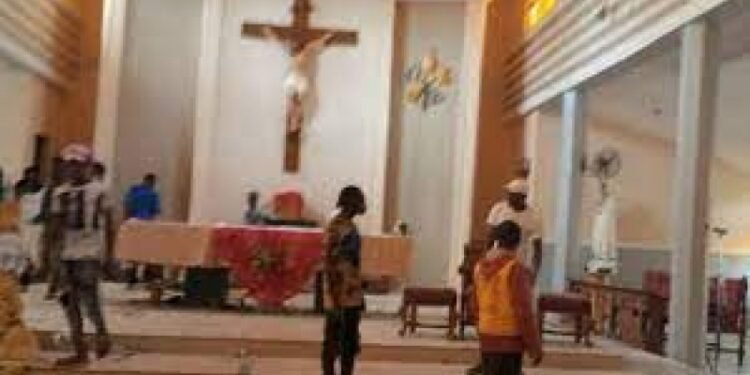The spate of terror attacks on the Catholic Church in various parts of the country should be addressed before it gets out of hand and further polarizes Nigerians across the Faith divide. In Ondo State, Plateau State, Edo State and various local government areas of Kaduna State, among others, the church has been the object of attacks in recent history, with the Owo incident constituting perhaps the most devastating offensive against the oldest Christian denomination.
Service was almost over in the ancient town of Owo, Ondo State, early last month when agents of death struck with explosives and other weapons that were deployed in killing scores of worshippers and inflicting grave injuries on many others. Hues and cries as well as claims and counter-claims that trailed the tragedy have not yielded much as no one has been brought to book till date. While the church denomination was still counting its losses, Catholic priests in Kafanchan, Kaduna State were abducted. One was killed and the other managed to escape. Catholic priests in Edo and some Southeast states have suffered same fate.
The recurrence of attacks seemingly targeted at the Catholic fold raises some questions. Who is after the Catholic Church, and why the Catholic Church in particular, at least more than others as it seems? Why have Catholic priests become, apparently, prime targets of kidnappers and terrorists? Is the church regarded as a soft target, and why? Are Catholic clerics being targeted because of the size of the denomination, which perhaps suggest that there could be potential for drawing huge ransom? If that were so, why have the attacks persisted despite that the Church has insisted on a policy of not paying ransoms, so not to encourage more abductions? Or is there a way Catholic priests go about their ministerial duties that make them more vulnerable to attacks?
The Catholic Church must not be abandoned to its fate by the Nigerian state. It could give the wrong impression that the state is not bothered by whatever happens to members of a particular religious persuasion. In Owo, the Federal Government claimed within 72 hours that St. Francis Church was attacked by the Islamic State West Africa Province (ISWAP), but Ondo State Governor Oluwarotimi Akeredolu said there was no convincing proof that was the case. The indecent haste to pin the crime on ISWAP gave the impression of some subterfuge because, till date, ISWAP that is always quick to own its attacks is yet to own the Owo attack.
The Federal Government and its security agencies have a duty to launch a thorough probe into the incessant attacks on the Catholic Church. Security forces should also come up with a plan to protect the church’s members and clerics under the present circumstance of their peculiar vulnerability. But it is equally incumbent on the church to device means of curtailing the exposure of its priests, especially in areas where they are prone to such attacks. It is not out of place for men of God to be shielded from undue onslaught.
As an international assembly of believers, the Catholic Church in Nigeria could draw from the experience of other countries where the church is strong, and others where they are beleaguered by terrorists. Meanwhile, government has a duty to do everything possible to get the country permanently off the list of rogue states where religious intolerance reigns. Nigeria already has enough crises and conflicts threatening to overawe her that it cannot afford to be seen in the light of a failed state by virtue of insecurity siege on the citizenry.
One primary responsibility of the President who is also the Commander-in-Chief of the Armed Forces is to act as Father of the Nation. He owes a duty to all citizens to promote unity and imbue confidence in them. When things are threatening to fall apart, the President should speak with various sections and allay sectarian fears. He should engage Catholic bishops, as representative of the Papacy, with a view to assuring them that the Nigerian state has the capacity to defend them and is taking all action necessary to defend them.
This should be extended to other denominational and religious persuasions where there may be fear of coming under insecurity siege as the Catholic Church has been under. Already, prominent leaders – political and religious – have been calling on their members to take recourse to self-defence. Although frontline spiritual leaders said it was not to involve drawing swords and bayonets for now, government should move to avert descent into such an abyss.
Nigeria is believed to be home to about 29 million Catholics who deserve to be protected. In Latin America, liberation theology was once the order of the day, provoking chaos. Nigeria as the most populous Black country should be spared the cataclysm that could come from religious crisis.






